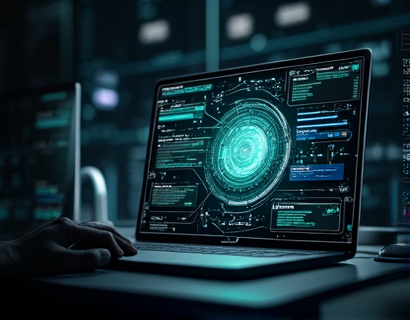Revolutionizing Productivity and App Accessibility: The Synergy of AI and Cryptocurrency
The integration of Artificial Intelligence (AI) and cryptocurrency is ushering in a new era of digital innovation, significantly enhancing productivity and app accessibility. This fusion of technologies is not just a trend but a transformative shift that is redefining how we interact with digital tools and manage tasks. For tech enthusiasts and early adopters, this convergence offers a glimpse into a future where efficiency is maximized, and user experiences are profoundly enhanced.
The foundation of this revolution lies in the unique capabilities of AI and the inherent value of cryptocurrency. AI brings intelligent automation, predictive analytics, and personalized user experiences to the forefront, while cryptocurrency provides a decentralized, secure, and transparent means of transaction and data management. Together, they create a powerful ecosystem that can revolutionize various aspects of digital life, from task management to app accessibility.
Enhancing Productivity with AI-Driven Solutions
AI has the potential to significantly boost productivity by automating repetitive tasks, providing intelligent recommendations, and optimizing workflows. One of the key areas where AI shines is in task automation. By leveraging machine learning algorithms, AI can identify patterns and automate routine tasks, freeing up time for more critical and creative work. For instance, AI-powered tools can manage email filtering, calendar scheduling, and document organization, ensuring that users focus on high-value activities.
Predictive analytics is another powerful feature of AI that enhances productivity. By analyzing historical data and user behavior, AI can predict future trends and suggest optimal actions. This capability is particularly useful in project management, where AI can forecast project timelines, resource allocation, and potential bottlenecks. Such insights enable better planning and execution, leading to more efficient project completion.
Personalization is yet another area where AI excels. AI-driven systems can learn from user preferences and behavior to tailor experiences and recommendations. This personalized approach ensures that users receive the most relevant information and tools at the right time, reducing decision fatigue and increasing overall efficiency. For example, AI can curate news feeds, suggest relevant articles, or recommend tools based on past interactions, making the digital environment more intuitive and user-friendly.
Streamlining App Accessibility through Blockchain Technology
Cryptocurrency and blockchain technology play a crucial role in enhancing app accessibility. By leveraging blockchain, applications can achieve a higher level of security, transparency, and user control. Blockchain's decentralized nature ensures that data is not stored in a single location, reducing the risk of data breaches and unauthorized access. This decentralization also means that users have greater control over their data, as they can manage permissions and access rights directly.
One of the most significant benefits of blockchain in app accessibility is the creation of decentralized applications (dApps). Unlike traditional apps that rely on centralized servers, dApps are built on blockchain networks, ensuring that they are more resilient and less prone to censorship. This decentralized architecture allows for seamless access to applications from anywhere in the world, without the need for intermediaries. Users can interact with dApps using cryptocurrencies, which serve as a medium of exchange within the blockchain ecosystem.
Cryptocurrencies also facilitate microtransactions, making it easier for users to pay for small services or content within applications. This is particularly useful for micro-task markets, where users can earn rewards for completing small tasks or providing micro-services. The use of cryptocurrencies eliminates the need for traditional payment gateways, reducing transaction fees and increasing the speed of transactions. This makes app usage more accessible and cost-effective, especially for users in regions with limited financial infrastructure.
Intelligent Task Management Systems
The combination of AI and blockchain technology is giving rise to intelligent task management systems that redefine how we handle workflows and collaborations. These systems use AI to automate task assignment, prioritize tasks based on urgency and importance, and provide real-time updates on project progress. Blockchain ensures that all transactions and data related to tasks are secure and transparent, building trust among team members and stakeholders.
For instance, an AI-powered task management platform can analyze the skills and availability of team members to automatically assign tasks. It can also predict potential delays and suggest adjustments to the project timeline, ensuring that deadlines are met efficiently. The use of smart contracts on the blockchain can automate payment processes, ensuring that contributors are compensated promptly and fairly based on their contributions.
Moreover, these systems can integrate with other AI-driven tools, creating a seamless ecosystem for productivity. For example, an AI assistant can sync with a task management platform to provide real-time suggestions and reminders, enhancing the user's ability to manage their workload effectively. This integration not only streamlines processes but also creates a more cohesive and efficient work environment.
Enhancing App Accessibility for All Users
Accessibility is a critical aspect of app development, and the fusion of AI and blockchain technology is making significant strides in this area. AI can help create more inclusive applications by providing personalized user interfaces and adaptive features. For users with disabilities, AI-driven voice recognition, text-to-speech, and image recognition technologies can make apps more accessible and user-friendly.
Blockchain technology complements this by ensuring that user data and preferences are securely stored and managed. Users can control who has access to their data and revoke permissions as needed, providing a higher level of privacy and security. This user-centric approach not only enhances the accessibility of apps but also builds trust and confidence among users.
Furthermore, blockchain-based identity verification systems can simplify the process of accessing apps and services. By using decentralized identity solutions, users can authenticate themselves without relying on centralized authorities. This not only reduces the friction associated with traditional login methods but also enhances security by minimizing the risk of identity theft.
Future Prospects and Challenges
The potential of AI and cryptocurrency to revolutionize productivity and app accessibility is vast, but there are also challenges that need to be addressed. One of the primary challenges is the scalability of blockchain networks. As the number of users and transactions increases, blockchain networks must be able to handle the load efficiently without compromising performance. Ongoing research and development in blockchain technology aim to address these scalability issues, ensuring that the ecosystem can support widespread adoption.
Another challenge is the regulatory landscape. The intersection of AI and cryptocurrency operates in a relatively uncharted territory, and regulatory frameworks are still evolving. Ensuring compliance with existing laws while advocating for favorable regulations is crucial for the sustainable growth of this ecosystem. Collaboration between technologists, policymakers, and industry stakeholders is essential to create a balanced and supportive environment.
Despite these challenges, the future looks promising. As AI continues to advance and blockchain technology matures, the synergy between these technologies will lead to more innovative and powerful digital solutions. The next generation of productivity tools and apps will be more intelligent, secure, and accessible, transforming the way we work and interact with digital platforms.
For tech enthusiasts and early adopters, embracing this fusion of AI and cryptocurrency offers exciting opportunities. By staying informed and experimenting with new technologies, they can be at the forefront of this digital revolution, reaping the benefits of a more efficient and inclusive digital world.










































